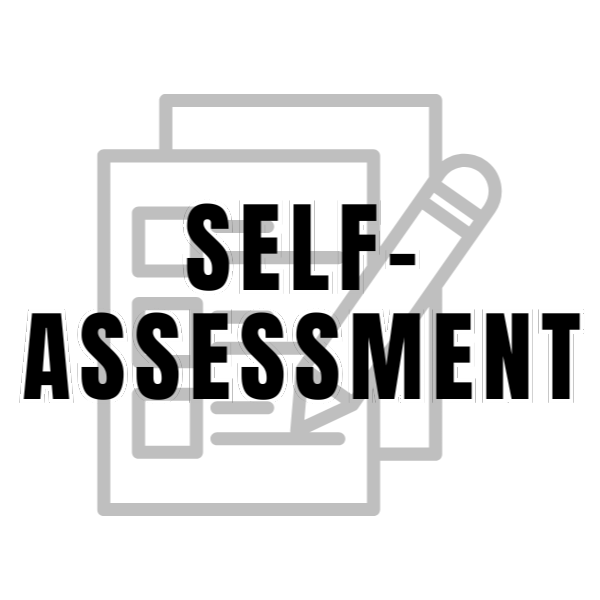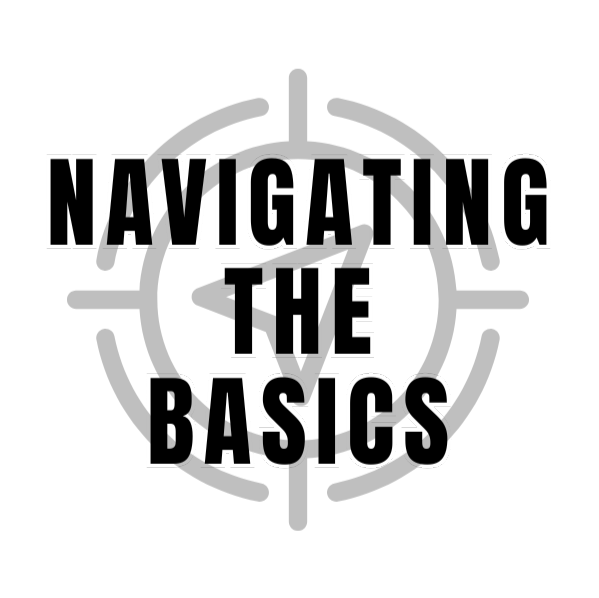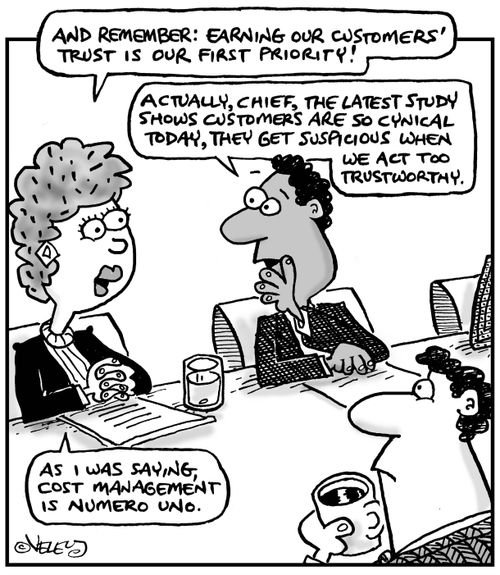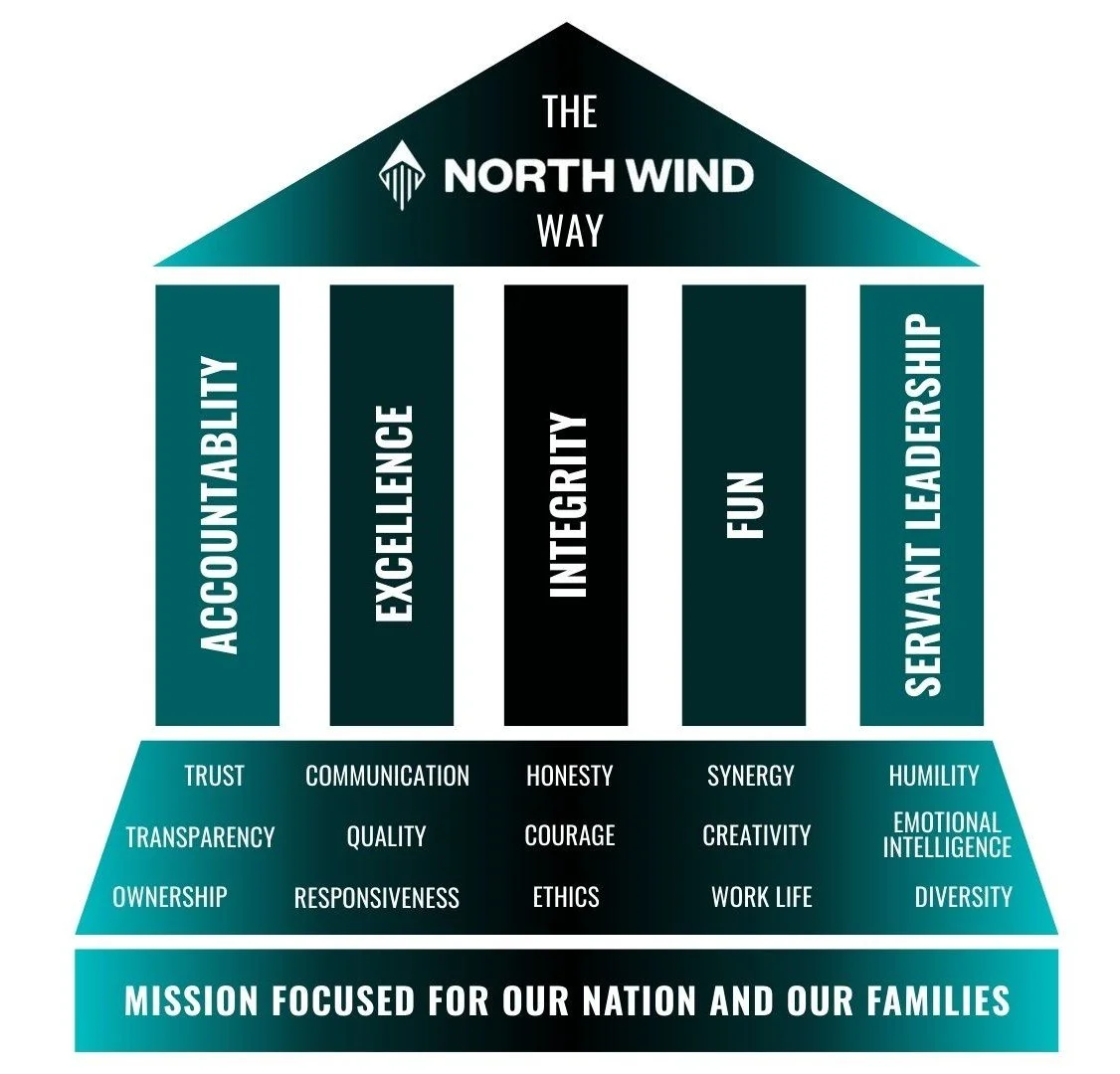Trust Matters: Foundations for Strong Leadership
At North Wind, leadership depends on accountability, consistency, and respect. Trust is built through daily choices: how you communicate, how you follow through, and how you support the people around you. It doesn’t require a title or a formal team. It takes shape through steady, clear actions that influence how others work and respond.
This session focuses on five traits that support trust: benevolence, honesty, openness, reliability, and competence. These traits are visible in the way leaders interact with employees, solve problems, and manage responsibilities. When trust is present, people are more likely to speak openly, stay focused, and approach their work with care and confidence.
Self-Assessment:
Trust Matters: Foundations for Strong Leadership
Please take a few moments to contemplate the following self-reflection questions. Where can you identify opportunities for personal growth in your leadership?
How often do I consider the well-being of others when making decisions?
Do I respond to challenges with patience and care?
Am I honest when mistakes happen, and do I communicate clearly during difficult situations?
Have I created space for others to speak honestly without hesitation?
What feedback have I invited or acted on in the last few weeks?
Are my follow-through habits consistent and visible to others?
Where have I demonstrated sound judgment or grown my expertise?
What opportunities have I supported for others to learn or improve?
Remember, this self-assessment is just a starting point for understanding your knowledge of Trust as a leader. It's essential to reflect on your responses and actively work on areas where improvement is needed. Additionally, seeking feedback from others and working with your ECFL Leadership Coach can provide valuable insights into your strengths and weaknesses.
Trust is the foundation of good leadership. Leaders who consistently show key traits can build trust over time. Let’s take a closer look at these five traits:
Benevolence
The word benevolence comes from the Latin term benevolentia, meaning “good will” or “the desire to do good.” Over time, it has become a universal value appreciated across all cultures. Acts of kindness, such as helping others, volunteering, or giving back to the community, are often praised and encouraged. In leadership, benevolence is about showing empathy, compassion, and care for your team. When leaders put their team’s well-being first, they create an environment where people feel valued and supported. This builds trust and makes it easier for team members to share their thoughts and feelings. Benevolence becomes even more important during stressful times when emotions run high. Leaders who show patience, understanding, and kindness during these moments set a strong example, earning respect and loyalty from their teams.
Honesty
Honesty is a key part of creating trust and transparency in leadership. It’s not just about telling the truth—it’s also about admitting when you’ve made mistakes, being upfront about challenges, and sharing both good and bad news. When leaders are truthful, even when it’s uncomfortable, they show their team that integrity is a priority. Being honest builds credibility and sets the tone for others to do the same. Team members are more likely to trust a leader who is open and accountable. This creates a culture where people feel safe to speak up, take responsibility, and grow.
Openness
Openness in leadership means being willing to share information, listen to others’ ideas, and consider different perspectives. Leaders who are open show that they value their team’s input and encourage a work environment where everyone feels comfortable speaking up. Being open in your communication helps build trust because it shows humility and a commitment to learning. Teams that feel heard are more likely to share creative solutions and collaborate effectively. Leaders who are open to feedback demonstrate that they are always working to improve, which strengthens their connection with their teams.
Reliability
Reliability means being someone your team can count on. Leaders show reliability by consistently following through on promises, meeting deadlines, and staying true to their word. This builds a sense of stability that helps teams feel secure, especially during times of change or uncertainty. When leaders are reliable, they create trust and reduce stress for their teams. Team members know they can depend on their leader’s support no matter the situation, which gives them the confidence to focus on their work and perform their best.
Competence
Competence is a leader’s ability to perform their role effectively and guide their team toward success. Leaders who are competent have the skills, knowledge, and expertise to make informed decisions and solve problems. They inspire confidence by continuously learning and staying up-to-date with trends in their field. Competent leaders also act as a resource for their teams, offering guidance and support when needed. This creates trust because it shows the leader is capable of helping the team reach its goals and overcome challenges.
“While selfishness joins hands with no one of the virtues, benevolence is allied to them all.”
Read the following scenario to see how the foundations of Trust can transform your leadership:
The Journey of Pepper: From Uncertainty to Excellence
Pepper was recently promoted to team leader at Stark Industries, a busy software company. While excited about her new role, she felt unsure if she could manage the team effectively and meet the high expectations set for her.
During her first few weeks, Pepper struggled to delegate tasks, leaving her overwhelmed and stressed. Deadlines were missed, and her team’s morale began to drop. Realizing she needed to improve, Pepper sought advice from her mentor, Tony, a respected leader in the company.
Tony encouraged Pepper to focus on two key traits: reliability and competence. He explained that reliability meant always keeping her promises and showing her team they could count on her. Competence, he said, was about developing the skills and knowledge needed to lead with confidence.
Pepper took his advice seriously. She started by setting clear expectations with her team and holding regular meetings to discuss goals, progress, and challenges. This helped create a more transparent and accountable environment. Pepper also made sure to follow through on all her commitments, no matter how small, and her team quickly noticed her consistency and dedication.
As she worked on improving reliability and competence, Pepper realized trust also involved being honest about her struggles, open to her team’s ideas, and showing she truly cared about their well-being. She shared her challenges openly and encouraged her team to do the same. By listening carefully and offering support when needed, she built a sense of care and empathy that helped the team feel safe and valued.
Pepper also focused on growing her competence. She dedicated time each week to learning more about project management and software development practices. She attended workshops, read articles, and even enrolled in an online course. Pepper encouraged her team to grow as well, creating a culture where learning and improvement were priorities.
Over the next few months, the change in Pepper’s leadership style became clear. She was no longer the unsure leader who struggled with delegation. Instead, she became a dependable and skilled leader who inspired confidence. Her team began meeting deadlines, improving the quality of their work, and feeling more motivated.
Pepper’s journey shows how focusing on reliability, competence, and care can transform not only a leader but also the team they lead. By committing to these traits, she turned her challenges into successes, setting an example for others to follow.
Reflection Questions:
What steps did Pepper take to become a more reliable leader?
How can you ensure that you consistently follow through on your commitments?
What strategies can you implement to build trust within your team?
In what ways did Pepper work on improving her competence as a leader?
What areas of your skillset do you think need improvement?
How can you incorporate continuous learning into your routine?
“No act of kindness, no matter how small, is ever wasted.”
Building trust in leadership takes more than good intentions. It requires consistency, reflection, and a clear understanding of how your actions affect others. The practices below align with five core traits that help strengthen trust: benevolence, honesty, openness, reliability, and competence. These are not one-time efforts, but instead are habits that shape how you show up and how others experience your leadership.
Demonstrate Benevolence: Show care in how you communicate, make decisions, and respond to challenges. Empathy builds trust when it is present in daily interactions. Take time to check in with others, listen with attention, and respond with patience—even when the pace of work is high.
Practice Honesty: Speak truthfully, especially when circumstances are difficult or uncertain. Admit mistakes and share information clearly. Being honest helps others feel more secure and more likely to respond in kind. Trust grows when people can rely on your words to match your actions.
Cultivate Openness: Openness includes both sharing and listening. Be willing to hear different perspectives and invite input when decisions affect others. Accept feedback without defensiveness, and take time to follow up when someone raises a concern or shares an idea.
Be Reliable: Follow through on what you say you will do. Meet deadlines, keep appointments, and communicate clearly if plans change. When others know they can count on your consistency, it creates stability and lowers stress. Reliability is often remembered more than intention.
Develop Competence: Stay committed to your own learning and development. Whether through formal training or hands-on experience, growth builds trust by showing that you take your role seriously. When you handle responsibilities with skill and continue to improve, others are more confident in your leadership.
Reflection Questions
Which of the five trust traits feels strongest in your current leadership habits, and what helped shape that strength?
Where might your consistency or follow-through need more attention, and what would help you improve it?
How will you recognize moments in your day where trust can be strengthened through small, steady actions?
Trust is part of how leaders at North Wind carry out their work each day. It is shaped by fairness, steady follow-through, and honest communication. When these habits are present, people are more likely to ask questions, stay focused, and feel confident in how the work is being done.
Over time, trust becomes the base that other habits are built on. It influences how people communicate, how they solve problems, and how they show up for each other. And while trust depends on many shared efforts, it often begins with one person choosing to lead with integrity. That choice, to take ownership and be accountable, is where we turn next.
Elevate your understanding of the five attributes of Trust by taking flight with the following resources. Use this opportunity to navigate, uncover, and expand the horizons of your leadership influence.
The Power of Reliability: A Pillar of Trust and Success
3 Strategies for Leading Through Difficult Times
Ten Ways to Build Trust on Your Team
The Importance of Trust (5:36)









